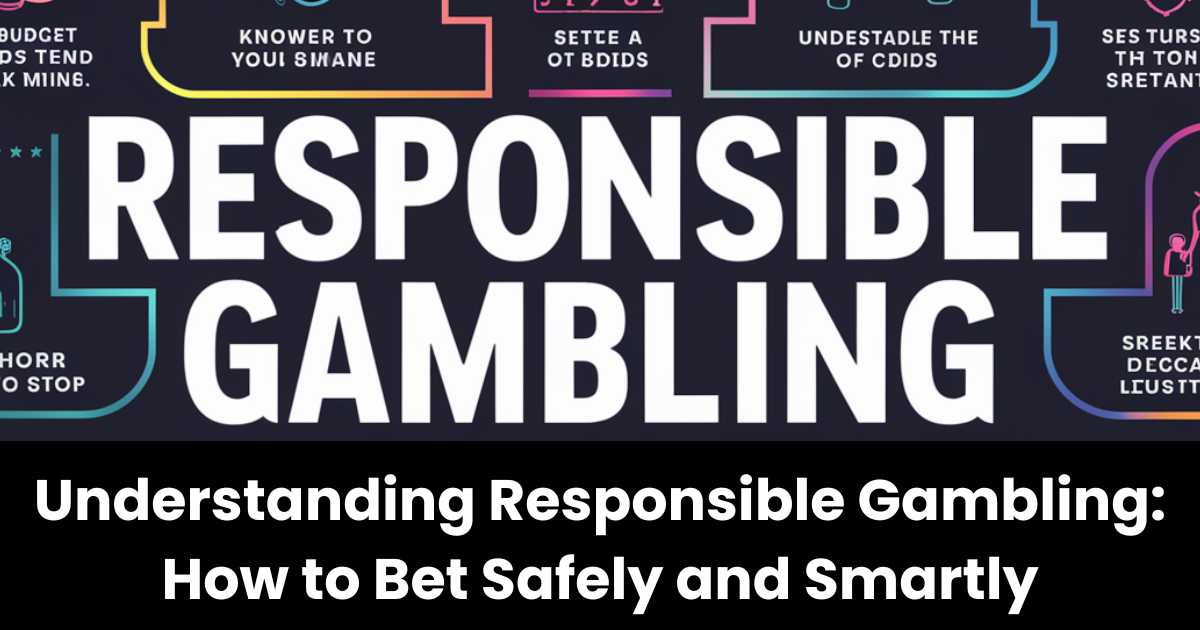Understanding Responsible Gambling: How to Bet Safely and Smartly
Gambling can be a fun and exciting way to engage with your favorite sports, but it’s important to approach it with caution. Responsible gambling is about enjoying the experience while staying in control of your betting habits, ensuring it remains a form of entertainment rather than a potential problem. This guide will walk you through what responsible gambling means, how to practice it, and why it’s crucial for both beginners and experienced bettors alike.
What Is Responsible Gambling?
Responsible gambling refers to betting in a way that minimizes risk to yourself and those around you. It’s about setting limits, managing your bankroll carefully, and ensuring that gambling doesn’t negatively affect other aspects of your life. Whether you’re betting on cricket, playing cards, or trying your luck at a casino, responsible gambling helps keep the experience enjoyable and safe.
Key Principles of Responsible Gambling
Set a Budget and Stick to It
One of the most important aspects of responsible gambling is setting a budget for how much money you can afford to lose. This budget should be separate from your regular expenses like rent, bills, and savings. Once you’ve set this budget, stick to it—never exceed it, even if you feel like you’re on a winning streak or chasing losses.
Tip: Before you start betting, decide on a fixed amount that won’t affect your financial well-being if lost. For example, if you’ve set aside ₹5,000 as your gambling budget for the month, avoid dipping into other funds, no matter what.
Limit Your Time
Just as important as managing your money is managing your time. It’s easy to get caught up in the excitement of a match or a game, but setting time limits ensures that gambling doesn’t take over your life. Responsible gambling means balancing your betting activities with other hobbies and responsibilities.
Tip: Set a timer for how long you will gamble in one sitting and stick to it. Once the time is up, walk away—even if you’re winning.
Don’t Chase Losses
One of the biggest mistakes people make is trying to recover lost money by betting more aggressively. This is known as chasing losses, and it can lead to even bigger losses and emotional distress. Responsible gambling means accepting that losses are a part of the game and knowing when to step back.
Tip: If you’ve lost your budgeted amount for the day or week, stop gambling. Don’t place bigger bets to try to win back what you’ve lost.
Keep Gambling as a Form of Entertainment
Gambling should be seen as a form of entertainment, not a way to make money or solve financial problems. The thrill of gambling comes from the uncertainty of the outcome, and while it’s possible to win, it’s equally possible to lose. Betting responsibly means enjoying the process rather than focusing on the potential profits.
Tip: Treat the money you bet as the cost of your entertainment, similar to spending on a movie or a meal out. If you win, it’s a bonus!
Recognizing the Signs of Problem Gambling
It’s important to recognize when gambling is starting to become a problem. If you find yourself unable to stick to your budget, constantly chasing losses, or feeling anxious or stressed about your bets, it may be time to take a step back. Here are some signs of problem gambling:
- Betting more than you can afford to lose
- Neglecting responsibilities because of gambling
- Borrowing money to place bets
- Feeling guilty or stressed after gambling
- Betting to escape problems or negative emotions
Tips for Staying in Control
Self-Assessment
Regularly assess your gambling habits. Ask yourself if you’re staying within your budget, if you’re gambling more than you intended, or if you’re feeling frustrated or anxious about betting. Being honest with yourself is key to staying in control.
Tip: Keep a gambling diary where you record your bets, stakes, and time spent gambling. Review it regularly to ensure you’re sticking to your limits.
Take Breaks
If you find yourself spending too much time gambling or feeling overwhelmed by your losses, take a break. Stepping away for a few days or even weeks can help you regain perspective and ensure you’re gambling for fun, not out of habit or desperation.
Tip: Set regular non-gambling days where you focus on other hobbies and activities.
Use Tools for Control
Many betting platforms offer tools to help you gamble responsibly. These tools can include setting deposit limits, loss limits, or time reminders to help keep your gambling in check.
Tip: Take advantage of responsible gambling tools offered by betting websites and apps. Set limits on how much you can deposit or how long you can spend on the platform.
When to Seek Help
If you feel that gambling is starting to negatively impact your life, it’s essential to seek help. There are many resources available, from support groups to professional counseling, that can assist in addressing problem gambling. Remember, there’s no shame in asking for help—taking action is a sign of strength.
Tip: In India, several helplines and support services are available for those struggling with gambling. You can reach out to organizations that specialize in helping individuals regain control over their gambling habits.
Responsible Gambling Myths Debunked
There are many myths surrounding gambling that can lead people to make poor decisions. Adding a section on debunking these myths can help your readers better understand how to approach gambling responsibly.
Common Myths to Address:
- Myth 1: “I can win back my losses if I keep betting.”
- Reality: Chasing losses is a dangerous habit that often leads to bigger losses. Gambling is unpredictable, and past losses don’t predict future wins.
- Myth 2: “I’m due for a win soon.”
- Reality: Each bet is independent, and previous results don’t influence the future outcome. This is known as the “gambler’s fallacy.”
- Myth 3: “I can control the outcome.”
- Reality: Gambling outcomes are based on chance, and no strategy or technique can guarantee a win.
Balancing Gambling with Life
Responsible gambling also involves ensuring that your betting activities do not negatively impact other areas of your life. This section can emphasize the importance of balance.
Points to Cover:
- Make Time for Other Activities: Make sure gambling doesn’t take away from spending time with family, friends, or hobbies.
- Maintaining a Healthy Lifestyle: Keep a balance between gambling and physical and mental health activities like exercise, sleep, and mindfulness.
Gambling in the Digital Age
With the rise of online betting and mobile apps, gambling has become more accessible than ever. This section can talk about how to gamble responsibly in the digital era and how to protect yourself from the risks of excessive online gambling.
Tips for Online Gambling:
- Use Self-Exclusion Features: Many online platforms offer self-exclusion options where you can block yourself from betting for a set period.
- Watch Out for In-App Purchases: Some gambling apps may encourage in-app purchases. Be aware of how much you’re spending beyond your bets.
- Control Notifications: Disable notifications or set limits on app usage to avoid constant reminders that may tempt you to gamble impulsively.
Responsible Gambling for Young Adults
Gambling among young adults, especially in the online space, is on the rise. A section focusing on educating younger audiences could be valuable. This could discuss the importance of understanding gambling, recognizing risks early, and setting boundaries.
Focus Points:
- Education on Gambling Risks: Explain the risks associated with gambling and how young people can protect themselves.
- Peer Pressure and Gambling: Encourage young adults to gamble only when they want to, not because of social pressure.
Local Responsible Gambling Resources
Providing readers with information on local resources available in India for those seeking help could be extremely useful. Adding helplines, online support groups, or government programs can give practical next steps for those in need.
Example:
- NCPG India: The National Council on Problem Gambling offers resources and helplines to help individuals with gambling problems.
- Helpline Numbers: Include the contact information for gambling addiction helplines that are available in India.
Tips for Family and Friends of Gamblers
It’s also important to address the role of family and friends in helping someone who may be struggling with gambling. This section could provide advice on how loved ones can support a responsible gambler or help someone who might be developing a problem.
Support Tips:
- Open Communication: Encourage open conversations about gambling and the risks associated with it.
- Recognizing the Signs of Problem Gambling: Help family members recognize when gambling is becoming a problem and how to offer support.
- Intervention Resources: Provide information on how families can intervene respectfully if they believe a loved one has a gambling problem.
Mindful Gambling
Introducing the concept of mindful gambling—where bettors are encouraged to be fully present and aware of their actions—could add a unique angle to responsible gambling. This could include tips on how to stay mindful while gambling, such as taking regular breaks, reflecting on your motivations, and checking in with your emotions.
Responsible gambling is all about maintaining control and enjoying the betting experience without letting it take over your life. By setting limits, managing your bankroll, and keeping gambling as a form of entertainment, you can enjoy the excitement of betting in a healthy way.
Remember, gambling is meant to be fun. If it stops being enjoyable, it’s time to reassess your approach. Stay in control, gamble responsibly, and make sure it remains a positive experience for you and those around you.






